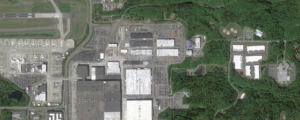
Cleanup for the Boeing Everett Plant site extends to the headwaters of Powder Mill Creek, at lower right. Photo courtesy WA Dept. of Ecology. Click to enlarge.
The Boeing Company will complete soil and groundwater cleanup work at its Everett aircraft plant, under a draft set of studies, plans, orders and other documents available for public comment from the Washington Department of Ecology. The comment period runs through April 19, 2021.
Boeing has conducted nearly two decades of work to study contamination from past operations, evaluate cleanup options and carry out preliminary cleanup work, known as interim actions. The cleanup plans now available for comment build on the earlier efforts.
State and federal laws, first adopted in the 1980s, require practices to prevent releases of dangerous wastes. Past releases to soil, groundwater, surface water and sediments have included solvents, fuels, oils, heavy metals, and polychlorinated biphenyls.
On-site and off-site cleanup areas
The cleanup involves several locations on Boeing property and an area, north of the property, where a plume, or area, of contaminated groundwater affects the upper reaches of Powder Mill Gulch in Everett. Groundwater seeps that form the headwaters of Powder Mill Creek contain solvents at levels above surface water cleanup standards. The creek flows through Mukilteo and into Puget Sound.
Boeing’s interim actions included underground heating of an area on its property that was a source of groundwater contamination affecting the creek. The heat converted liquid solvent into vapors that were captured by a recovery system. Plans for the final cleanup in this area include bioremediation, or injecting nontoxic nutrients that help bacteria in the soil break down the remaining solvent.
In Powder Mill Gulch, Boeing has been pumping out groundwater, treating it and releasing it into the creek. Plans for the final cleanup include a dynamic groundwater recirculation system throughout the plume area. The system will re-inject the treated water back in to the ground to flush more contaminants toward the extraction wells. The company will continue to monitor the groundwater plume that moves from Boeing property toward the gulch.
The groundwater and creek are not sources of drinking water, but signs at public trails in the gulch warn people to avoid contact with the creek water for them or their pets.
Some areas of contamination on Boeing property will be confined in place because they are under buildings that are in use. These sites will be monitored to confirm that pollutants remain isolated from the environment until the cleanup can occur.
Work on accessible sites, including the Powder Mill Gulch groundwater plume, will continue until pollution levels fall below state cleanup standards.
Boeing conducts the work under a Corrective Action Permit, which has come up for renewal. Ecology proposes to reissue the permit, and the draft renewal also is available for public comment.
Documents available for review and comment:
All documents are available on Ecology’s website as PDF files.
· Remedial Investigation/Feasibility Study/Supplemental Feasibility Study: A two-volume report presenting a comprehensive study to locate, map, and measure the site’s contamination, completed in 2012; a study of cleanup approaches for each contaminated area, completed in 2016; and a study of cleanup options for Powder Mill Gulch, completed in 2019.
· Enforcement Order: An order drafted by Ecology for the Boeing facility and Powder Mill Gulch groundwater and surface water cleanup.
· Agreed Order: Submitted by Boeing, with Ecology review and approval, for the cleanup of one contaminated area of the site.
· Draft Cleanup Action Plan (dCAP): An overall plan for cleanup of the site.
· Draft Permit: Boeing’s Everett facility operates under a federal permit for long-term storage of hazardous waste. While Boeing no longer stores such waste long term, Federal regulations require that the hazardous waste permit remain in force until all waste-related activities are complete, including cleanup. This permit must be renewed every 10 years.
· Draft Public Participation Plan: Explains how Ecology will keep the community informed about the cleanup process, and how people can get involved.
· Draft State Environmental Policy Act (SEPA) Checklist and Determination of Non-Significance: Ecology’s review of the cleanup plan under SEPA, which determined that the cleanup activities would not be likely to cause harmful environmental impacts.
How to comment:
· Ecology’s online comment app
· Email to: paul.bianco@ecy.wa.gov
· Mail to: Boeing Everett Comments; Paul Bianco, Site Manager; Dept. of Ecology; 3190 160th Ave. SE; Bellevue, WA 98008-5452
For more information:
· Ecology’s website provides background on the site and includes links to all documents




March 2, 2021
Everett